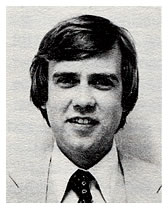
One who took part in WBT's "evolution" was H. A. Thompson, a popular morning DJ.


One who took part in WBT's "evolution" was H. A. Thompson, a popular morning DJ.
At the end of the 1960s, WBT's local and national sales continued to do well. In fact, in the May 19, 1969 edition of The Jeffcaster, General Manager Paul Marion was "singing the praises of Harold Hinson and his staff...April was the best sales month in WBT history." But the ratings trend was clear. Big WAYS, the top-40 powerhouse in the market, with Jay Thomas as the morning man, was eating BT's lunch in the age bracket that really mattered, 25 to 49.
Along the way, General Manager Hinson was being advised by David Klemm of Blair Radio, WBT's national advertising rep, that the days of old-line network affiliates were over, days when long-established stations could rely on their history and reputation to keep them popular and competitive.
It was about that time that J-P President Roger Soles implemented across the entire corporation a rigorous regimen of strategic planning, whereby each subsidiary must construct and follow detailed, long-term operational and financial plans. In earlier times such plans were short on strategy, long on guesswork and suitable for filing and being forgotten.
So, in mid-1970 at a strategic planning meeting Harold Hinson went way, way out on a limb and advanced the proposal to (1) drop the CBS Radio Network entirely, and (2) replace the current program director with someone who knew "contemporary adult" music inside and out, and had the talent (and nerve) to develop and enforce a rigid format and a sacrosanct playlist. No timid souls need apply.
Management bought the whole deal (though some of the less enthusiastic members, as the months went by, grumbled all the way to the bank).
 |
Tom McMurray |
Within months Harold had hired as PD Tom McMurray, friend of David Klemm, and a man full of ideas and confidence. McMurray brought with him Bob Lacy, John Lambis and Mike Ivers, all of whom had worked with Tom in New England.
In March of '71, the new format kicked off and the impact was dramatic and immediate. After a few months the station surpassed WAYS in the ratings and stayed there. Tom, now deceased, was a master of his craft and deserves a huge amount of credit for WBT's turnaround and success in the coming years.
There is a web page devoted to Tom McMurray and his years at BT, based largely on Tom's own account of those times. We urge you to read the page and listen to the sound clips. You'll hear many of the station's jingles and voices, perhaps your own. Don't buy everything on the page as gospel. For example, some who were in a position to know deny that any advertising was cancelled to make way for the new format. And Tom's recollections of "saving" the station are a little too heavy on the "I" than the "we" as to whom credit is due.
At any rate, enjoy the page and the sounds, and if you were a staffer at WBT during those somewhat tumultuous years of change, take a bow for all your work in making the station a success.

Bob Lacy was one who came to WBT with Tom McMurrray. He was a popular DJ on WBT and later—and still— on WLNK. For about a decade he and Moira Quinn were co-hosts of WBTV's PM Magazine.